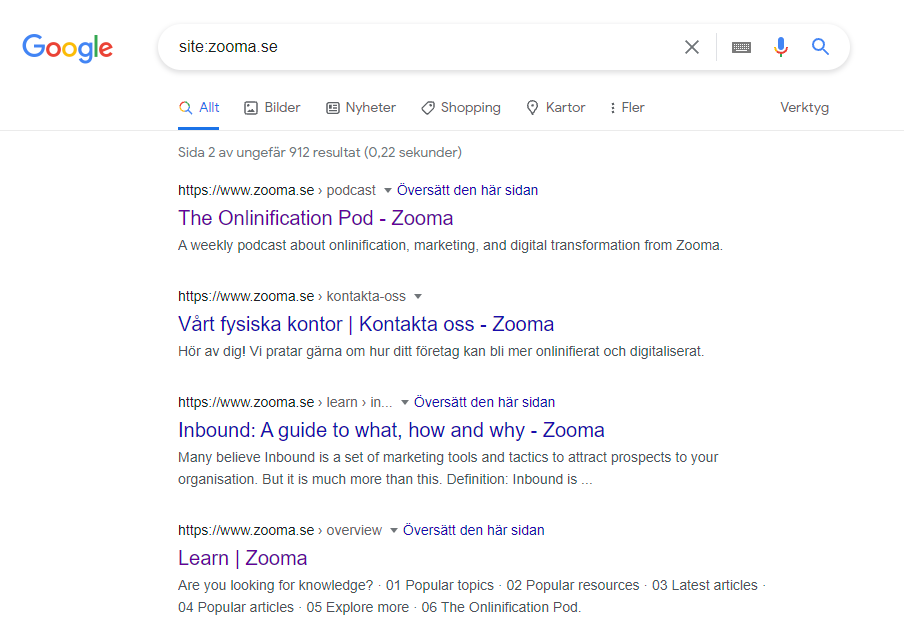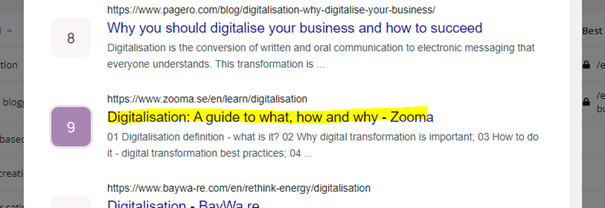- Learn
- The B2B Enablement Hub
- Why is Google rewriting the title tags of my website?
Why is Google rewriting the title tags of my website?
By Daniel Falk

Google is always making changes to their search engine results pages, or SERPs, but a recent change surprised website owners - they discovered that Google was rewriting or completely replacing the titles of their pages in search results. The change is meant to improve user experience, but if you want full control over your content, there's a few things you can do to keep your titles intact.
In the HTML specification, the 'title' element is described like this, under section 4.2.2:
"The title element represents the document's title or name. Authors should use titles that identify their documents even when they are used out of context, for example in a user's history or bookmarks, or in search results. The document's title is often different from its first heading, since the first heading does not have to stand alone when taken out of context."
So, the title should make it possible to identify the document even if you are using it out of context. That is a good summary of how you should think when writing the titles of the pages of your website.
The title element is essential because it helps you identify the content of the different tabs in your browser.

But the element also plays a specifically important role when it comes to search engine marketing. The title tag is displayed in the result pages of Google, Bing, Baidu, Yandex, etc., and it's the title tag you click to visit the websites in the search result.
That means that the content of the title tag is crucial because it helps the searcher decide whether your website is worth visiting. That's why the search engines put much emphasis on the title tag. Google wants happy customers satisfied with the search experience, and one part of that is serving easy-to-read and interpret content.
Compare the below titles. Which one would you prefer to click? The spammy first version, or the more on-point and better-structured second version?
Version 1 (spammy?)
Version 2 (good?)
Putting effort into writing excellent titles will increase your chance of ranking well and, at the same time, increase your click-through rate (CTR) from the search engine to your website. Straight-to-the-point and non-spammy titles have a better chance of ranking well, as they are the types of content Google wants to display to their "customers".
Things are changing: In August 2021, Google updated how they generate web page titles!
Since at least 2012, the way Google generates the titles in the search results has not changed much. In most cases Google has used the content specified between <title> and </title> in the HTML header in their search result pages. If the length of the text specified was too long, Google usually truncated the title.
Sometimes, Google also appended the name of the website or the business to the end of the title.
But since August 2021, Google has started to rewrite or even replace the titles that appear in search results. Many site owners soon reported that they had seen the updates, meaning that the rewriting was happening relatively quickly.
Google says that title tag rewriting is happening in 13% of cases
In a blog post published September 17, 2021, Google states that they use the title tag content around 87% of the time. This means that some kind of rewriting or replacement is happening 13% of the time.
This may change over time, as Google bases their action on real-world data, and in this case, customer feedback. When Google introduced this new update, apparently the title tag was "only" used in 80% of the cases, meaning that the titles were rewritten or replaced in 20% of the cases.
This was later changed to the percentage stated above (87%) based on customer feedback and (probably) actual user data.
Why does Google want to rewrite titles?
Google claims that making these changes will improve the search experience for their users.
They often see that the specified titles on pages they index are not good enough. In many cases, titles can be poor-quality, or completely missing. In others, title tags might only contain the name of the website, or fail to reflect the content of the specific page.
Another common issue with titles produced by a CMS is that the same title is used on multiple pages, despite them having different content. One example may be the contact page of a company that has locations in multiple cities. Under the contact page, each subsidiary may be presented on separate subpages that all share the same page title, for example:
- Contact us – This is our contact information – Acme Inc.
- Contact us – This is our contact information – Acme Inc.
- Contact us – This is our contact information – Acme Inc.
In this case, Google may rewrite the title of these pages to better reflect their content. After Google has rewritten the titles, they may look like this:
- Acme Inc. in Hamburg – This is our contact information
- Acme Inc. in Berlin – This is our contact information
- Acme Inc. in Munich – This is our contact information
This rewrite will help the searcher find what they are looking for more quickly.
What information is used when Google rewrites the title tag?
It has been noticed that Google often uses content from H1 or H2 tags when rewriting the titles. Some website owners have also noticed that the anchor text from internal links has been used as title tags.
Google's documentation on search appearance and title tags states that the following sources are used to generate the title tags shown in the search results:
- Content in <title> elements
- The main visual title or headline shown on a page
- Heading elements, such as <h1> elements
- Other content that's large and prominent through the use of style treatments
- Other text contained on the page
- Anchor text on the page
- Text within links that point to the page
What can I as a site owner do to prevent or control title tag rewrites?
Even though Google rewrites the title tags to improve the user experience, you may not be satisfied with your new, rewritten titles. At the moment, you can't tell Google not to rewrite the title tags of your site. However, there are some precautions you can take to prevent rewrites and keep your title tags as they are:
1. Map the impact of the rewrites for your site
How often does Google rewrite the title tags of your website? Search manually for your important keywords and check how your site is presented. Alternatively, if you are using a tool or service for ranking tracking, you can often see the exact title displayed by Google in the tool, making it easier to quickly understand how possible rewrites are affecting your website. Below is an example from Wincher:
2. Keep your titles within the length limit
Google is more likely to rewrite titles that are too short or too long. So make sure to write (or generate) title tags that fit as well as possible within the width of 600 pixels. Preview your titles and meta descriptions using a tool like Portent's SERP preview Tool or MOZ title length checker.
3. Write a readable sentence that's not stuffed with keywords
Google doesn't like spammy titles stuffed with keywords. Instead, write readable titles containing a maximum of one or two keywords. Avoid listing keywords separated by commas or pipes (|).
For more tips, I'd recommend reading Google's best practice for writing descriptive title tags. It covers the recommendations (and more) from this article.
For more SEO knowledge, take a look at these articles:
- A brief history of SEO
- SEO: What are topic clusters and pillar pages?
- Podcast: What you should know about SEO
Do you know how SEO customised your website is? Try our website grader to get the answers.
And for even more knowledge, subscribe!



